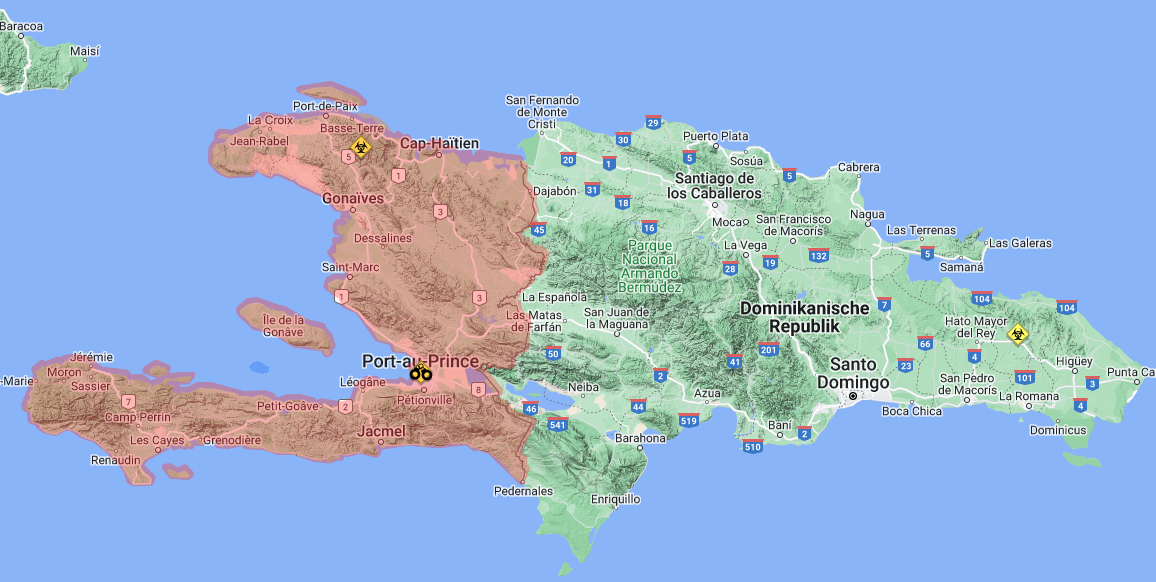Haiti: Island Nation of Disasters?
With its pleasant climate, beautiful beaches, colonial architecture, and unique cultural history, the island nation of Haiti should be among the top tourist destinations in the Caribbean. However, persistent political instability and a devastating earthquake in 2010 that essentially levelled the capital Port-au-Prince and killed up to 220,000 people have contributed to making the country the poorest in the entire Western Hemisphere. Since the 2010 earthquake, Haiti has suffered a series of natural disasters, a presidential assassination, as well as a precipitous rise in gang violence, all of which have helped to cripple much of what remained of its economy. Unfortunately, Haiti’s downward spiral might be about to accelerate yet again as ubiquitous gang violence morphs into open fighting in the streets of the capital.
The Curious Presidential Assassination
Even though it has been a little over a year since Haitian President Jovenel Moïse was assassinated, there are still many more questions than answers surrounding his murder. When on 7 July 2021 a group of armed mercenaries stormed the President’s home, they were met with no meaningful resistance from his security personnel – thereby fuelling rumours of collusion. Following the assassination, some of the assassins attempted to flee to the Taiwanese embassy, while others barricaded themselves in a nearby house. Dozens have been arrested in connection to the murder, but none have been charged and so far, four judges have stepped down from the case. The role of Haiti’s current leader, Prime Minister Ariel Henry, who was appointed mere days before the killing, is also suspicious. Not only did Henry have close ties to the alleged mastermind behind the assassination, he also fired several government officials for attempting to investigate his role in the plot. If the authorities can neither protect a president nor properly investigate his murder, then what can ordinary Haitians expect?
Gangs Running Amok
Even before the assassination of the president, the Caribbean island nation had been suffering from economic decline, goods shortages, and widespread gang violence. However, since the assassination, the country has entered into free-fall. More than 150 armed gangs are active in Haiti, which among other activities control the majority of the capital. Parts of the island nation are regularly cut off due to gang roadblocks, cargo cannot be unloaded due to the unstable security situation which in turn exacerbates goods shortages and particularly fuel shortages. The United Nations have warned that the heavily armed gangs are professionalizing and growing ever bolder. For instance, over a single five-day period in early July, at least 234 people were either killed or injured during open street fighting between rival gangs in the Citè Soleil neighbourhood of the capital Port-au-Prince.
In previous years, civilians have occasionally been caught in the crossfire of gang-on-gang violence, yet as clashes have become more brutal, combatants have grown increasingly indifferent to the distinction between enemy gang members and civilians. Among other things, the violence has led to the closure of about 1,700 schools, which in turn has ensured a steady supply of new recruits for criminal organizations. In a country where the majority of the population lives on less than four dollars a day, gang affiliation is often regarded as the only way out of poverty.
Abductions on the Rise
As economic activity continues to plummet, more and more people are finding themselves the targets of abductions, with even obvious poverty offering no protection. In 2021, more than 1,200 kidnappings for ransom were recorded, with the real number expected to be considerably higher. Ransom demands can range anywhere from 300,000 to 1 million US Dollars, and radio stations now regularly broadcast calls for help or donations. Although most victims are Haitians, some gangs have shifted their focus to kidnapping foreigners in order to extract higher ransom payments. Gangs both outnumber and outgun the police, as there are only about 9,000 officers patrolling the streets of a country with 11 million people. Consequently, abductors are rarely caught, and 2022 is already set to be yet another record-setting year when it comes to kidnappings and killings.
No Way Out?
Unsurprisingly, more than 82% of Haiti’s population would leave the island state if given the option, but there are few legal migration pathways. This has pushed a growing number of Haitians into migrating illegally either on foot or as is much more common on rickety boats. However, most countries in the Caribbean continue to bar their doors to refugees with at least 25,000 Haitians being expelled from various countries in the region in the last year alone. Political developments in Haiti are not exactly inspiring much confidence either. Prime Minister Henry has indefinitely delayed elections and insists on first improving the general security situation. At this point, it seems more likely that the island country will become majority gang-ruled by the time its feuding political leaders reach an agreement on the country’s future.
Where one crisis follows another, travel needs to be well-prepared. A3M’s Global Monitoring not only provides the latest information on developments in Haiti, but ensures that customers can travel safely around the globe with its worldwide coverage of civil unrest, terrorism, natural disasters, and transport incidents.

